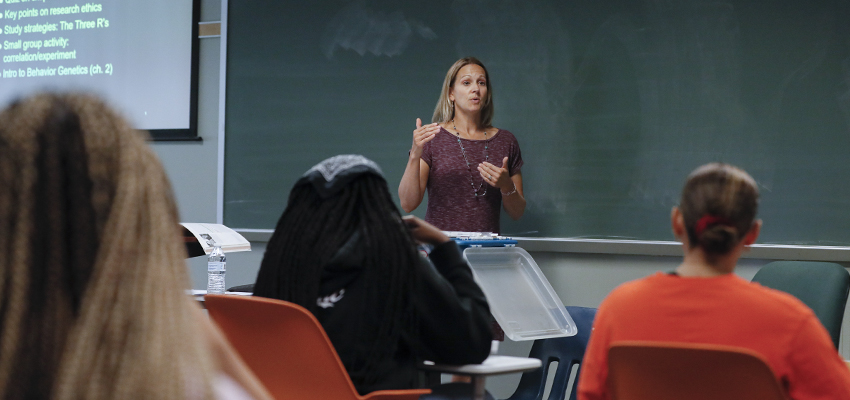
HWS News
13 September 2019 • Faculty • Research National Journals Publish Kingery and Bodenlos' Work on Mindfulness
Mindfulness is the topic of a peer-reviewed article recently published by Associate Professor of Psychology Julie Newman Kingery, Associate Professor of Psychology Jamie Bodenlos and student colleagues. The article discusses data collected from HWS students by Bodenlos and her research assistants.
"Facets of Dispositional Mindfulness Versus Sources of Social Support Predicting College Students Psychological Adjustment" published in Journal of American College Health, was written by Kingery, Bodenlos and Jessica Lathrop '18, an elementary teacher in Greenwich, Conn.
"Dispositional mindfulness (DM)," says Kingery, "looks at mindfulness as a trait and refers to the amount of this attribute that an individual displays in daily activities." "Many studies have looked at DM as a single entity," she says, "but her work breaks DM into five facets: nonreactivity to inner experience; observing/attending to sensations, thoughts or feelings; acting with awareness; describing feelings with words; and nonjudging of inner experience."
Kingery and Bodenlos study looked at these traits in relation to stress levels in 353 HWS undergraduates. "What we found out was that the mindfulness dimensions (or facets) of nonreactivity and nonjudging seemed to be most important," she says. "Those who are not reactive and who are less judgmental of themselves do better in terms of their perceived stress and emotional well-being. The study also indicated that females had higher perceived stress and lower emotional well-being then males."
Kingery also published, Mindfulness Practices in a Developmental Psychology Class: Student Outcomes, Practical Strategies, and Future Directions, in the journal Scholarship of Teaching and Learning in Psychology. It was authored by Kingery, Lathrop, Sarah Burstein '19, a medical technologist at Massachusetts General Hospital, and Mengqi Liu '18, who is pursuing a master's degree in developmental psychology at Columbia University.
For this study, the team presented brief, classroom-based mindfulness exercises to 26 upper-level students in one of Kingerys psychology classes; another 25 served as a control group with no mindfulness exercises. The team expected to find that the mindfulness group would have decreased stress and anxiety, but found that this was not the case.
"I was a little disappointed because I did not find differences, but I learned a lot," says Kingery. A larger study group and more focused mindfulness exercises might have changed the study outcomes, she believes. "What I saw as valuable with that experience was exposing the students to different mindfulness experiences in the hope that they would find something that was useful to them."
Liu was grateful for the experience. "Preparing an article for publication helped me to learn more about real-world research and publishing. Professor Kingery helped me to think more scientifically and professionally."

